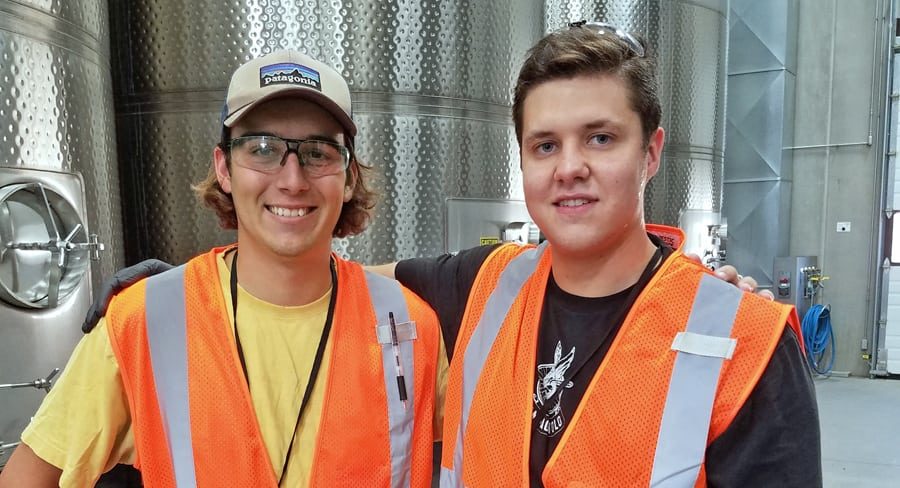
Home » Washington wine education thrives alongside industry
Washington wine education thrives alongside industry

September 13, 2018
By David Forsyth
One sign that an industry is maturing and becoming an important part of the regional economy is the development of an educational infrastructure that trains its existing and future workers.

Additional support comes in the form of research from some of these same facilities. Such is the case with the modern Washington wine industry. While relatively young, at 60 years old, Washington state has developed a world-class research and education network to train viticulturists, enologists, cellar workers, wine marketers and sales people to support the industry with research specific to issues in our region.
Research on wine grapes began in the ’50s with Walter Clore of Washington State University. Clore had planted native, hybrid and European (Vitus vinifera) varieties and he was evaluating their performance and promise in the challenging Washington environment. Through his work and the work of others like him, the wine industry began to grow. With that growth, in the early ’70s and ’80s, the Washington wine industry depended on trained winemakers and viticulturists brought in from other regions to fill the technical jobs, mainly from California, trained at UC Davis or Fresno. There also were wine professionals from Germany, France and other regions with established wine industries and universities.
In the early ’70s, the industry was able to get legislation enacted to create funding and oversight for research of wine and wine grape issues with an assessment of wines sold in Washington state. That oversight group, made up of winemakers and viticulturists, became the Wine Advisory Board and, to this day, provides recommendations to WSU for wine and grape research projects. Additionally, as the wine industry has grown, the university added additional wine and grape researchers and instructors who taught viticulture and enology classes and worked with an industry professional group, today known as the Washington Wine Technical Group, to sponsor seminars for training a growing number of industry professionals.
The wine industry, with its relatively low cost of getting into and the ability of small businesses to compete, allows for small startups and people getting into it as a second career. Many of these people, some older, do not have the time to return full time to school to complete a viticulture or enology degree and rely on industry seminars, reading, internships and the “school of hard knocks” to learn their grape-growing and winemaking skills. There are a number of high intensity programs that are offered to help teach people in this situation, such as the Walla Walla Community College and WSU certificate programs where a one- or two-year curriculum covers many of the must-know topics.
Fortunately, over the years, a number of higher education institutes have stepped in to provide schooling and formal programs for the Washington wine industry. Having this regional instruction is important because we have specific requirements and issues unique to Washington state and this allows Washingtonians the more affordable option of in-state tuition.
The largest program is at WSU, which offers undergraduate and graduate degrees in enology and winemaking, along with certificate programs. Located at the Chateau Ste. Michelle Wine Center in Richland, the program is in the center of the Washington wine grape industry. The facility was built with money raised from within the wine industry and then gifted over to the university. The $23 million facility is state-of-the-art and was built with expertise that was learned from the previously built UC Davis research enology and viticulture center. The facility has research labs, a research winery and classrooms, and has allowed for world-class wine research and teaching. The WSU undergraduate program also has an internship requirement that allows for students to work in a winery to practice their academic training in a functional winery. This internship also benefits the winery by supplying qualified and motivated workers during the harvest season when their labor requirements triple.
Another important supplier of trained wine industry personnel is Walla Walla Community College with its emphasis on hands-on training. It offers certificate and associate degrees in enology and viticulture, one which will prepare its students for a WSU undergraduate degree. Degrees in wine business and cellar maintenance also are available. Yakima Valley College also has certificate and associate degrees in viticulture and winemaking. Both of these programs can feed into a four-year degree at WSU.
With an emphasis on the business world, Central Washington University has a global wine studies program which trains professionals for the business side. It also has an internship program important in exposing students to the wine industry.
On the west side of the state, South Seattle College offers certificate and associate degrees in winemaking and wine marketing.
The Washington wine industry has come of age. Our wines are known and sold throughout the United States and are getting attention around the world, especially within the global wine industry with its discerning eye. We now have students coming from around the world to study, learn and work in Washington, adding to the diversity of wine knowledge and world experience.
The WSU Wine Center is also becoming a magnet for visiting professors who wish to study in our region in a well-appointed modern research and teaching facility staffed by renowned researchers. With the coming years we will continue to reap the fruit of our investments in education. \
David Forsyth is the winemaker and general manager of Four Feathers Wine Estates in Prosser.
Local News Education & Training
KEYWORDS september 2018





